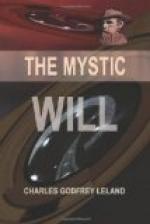Such beings do not come before the world, but hide their lights, knowing well that their magic would defeat itself, and perish if it were made common. Any person of the average worldly cast who could work any miracles, however small, would in the end bitterly regret it if he allowed it to be known. Thus I have read ingenious stories, as for instance one by HOOD, showing what terrible troubles a man fell into by being able to make himself invisible. Also another setting forth the miseries of a successful alchemist. The Algonkin Indians have a legend of a man who came to grief and death through his power of making all girls love him. But the magic of which I speak is of a far more subtle and deeply refined nature, and those who possess it are alone in life, save when by some rare chance they meet their kind. Those who are deeply and mysteriously interested in any pursuit for which the great multitude of all-alike people have no sympathy, who have peculiar studies and subjects of thought, partake a little of the nature of the magus. Magic, as popularly understood, has no existence, it is a literal myth—for it means nothing but what amazes or amuses for a short time. No miracle would be one if it became common. Nature is infinite, therefore its laws cannot be violated—ergo, there is no magic if we mean by that an inexplicable contravention of law.
But that there are minds who have simply advanced in knowledge beyond the multitude in certain things which cannot at once be made common property is true, for there is a great deal of marvelous truth not as yet dreamed of even by HERBERT SPENCERS or EDISONS, by RONTGENS or other scientists. And yet herein is hidden the greatest secret of future human happenings.
“What I was is passed
by,
What I am away doth fly;
What I shall be none do see,
Yet in that my glories be.”
Now to illustrate this more clearly. Some of these persons who are more or less secretly addicted to magic (I say secretly, because they cannot make it known if they would), take the direction of feeling or living with inexpressible enjoyment in the beauties of nature. That, they attain to something almost or quite equal to life in Fairyland, is conclusively proved by the fact that only very rarely, here and there in their best passages, do the greatest poets more than imperfectly and briefly convey some broken idea or reflection of the feelings which are excited by thousands of subjects in nature in many. The Mariana of TENNYSON surpasses anything known to me in any language as conveying the reality of feeling alone in a silent old house, where everything is a dim, uncanny manner, recalled the past—yet suggested a kind of mysterious presence—as in the passage:




